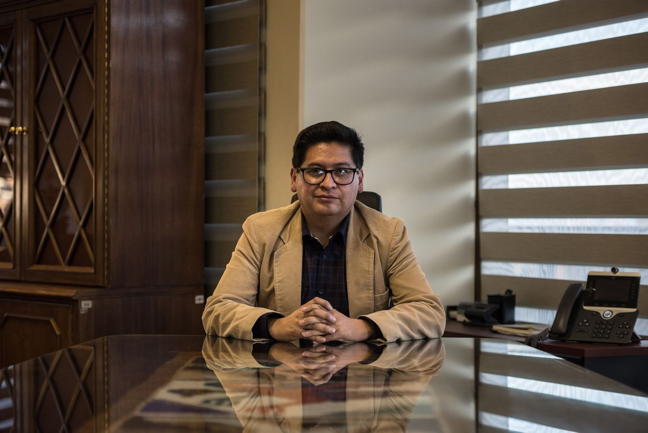
(above) Marcelo Montenegro Photographer: Marcelo Perez del Carpio/Bloomberg
Bolivia Crafts an Austerity Plan as Solution to Economic Crisis
November 14, 2020 - OriginaL article: Bloomberg
Sergio Mendoza and Jorgelina do Rosario
? New finance minister wants to boost state-owned companies
? Nation seeks a grace period to repay multilateral lenders
Bolivia aims to rein in its fiscal deficit with an economic austerity plan instead of fully relying on foreign debt, finance minister Marcelo Montenegro said.
The country’s new socialist government will closely analyze the international bond market to see if there are more attractive opportunities to borrow more in a world of low interest rates, Montenegro said.
The key for any potential new debt issuance is to evaluate the portfolio of projects in which to invest; a recovery of state-owned natural gas, aviation and telecommunications companies is set to be the flagship effort to boost economic growth, Montenegro said in an interview Friday evening in La Paz.
“A fiscal deficit is like a knee problem. Sometimes you can walk with a limp, but when the problem is so big you can’t even walk,” Montenegro said. “The president has given a clear message about austerity, and we are going to follow that direction.”
The International Monetary Fund forecasts that the country’s fiscal deficit will rise to 8.6% of GDP this year from 7.2% in 2019.
President Luis Arce won the election in October, marking the return to power in Bolivia of the socialist movement, a year after its leader Evo Morales was ousted and driven into exile.
Read more:
Socialists Retake Bolivia a Year After Morales Was Ousted
While the country will keep paying interest on the nation’s $2 billion in international bonds, Montenegro said he’ll seek to renegotiate a two-year grace period in payments to multilateral lenders such as the Latin American development bank CAF, the Inter-American Development Bank, and the World Bank.
“Two years is a period in which we can expect an economic recovery,” Montenegro said. Bolivia’s government owes $7.2 billion to multilateral lenders, Fitch Ratings said earlier this year, and $1.2 billion to bilateral lenders, including China.
The newly elected government is assessing a natural gas sale contract from Bolivia to Brazil that was signed in early March under the government of then-interim President Jeanine Anez. Montenegro said some conditions of that contract are “totally adverse” for the country, and without providing any further details said that the new administration’s hydrocarbons minister is looking for a solution.
The Finance Ministry also plans to defend the currency peg, as he sees no need for a devaluation of the boliviano.
The IMF forecasts that the economy will contract 7.9% this year. The landlocked country of 12 million people is the poorest country in South America after Venezuela.